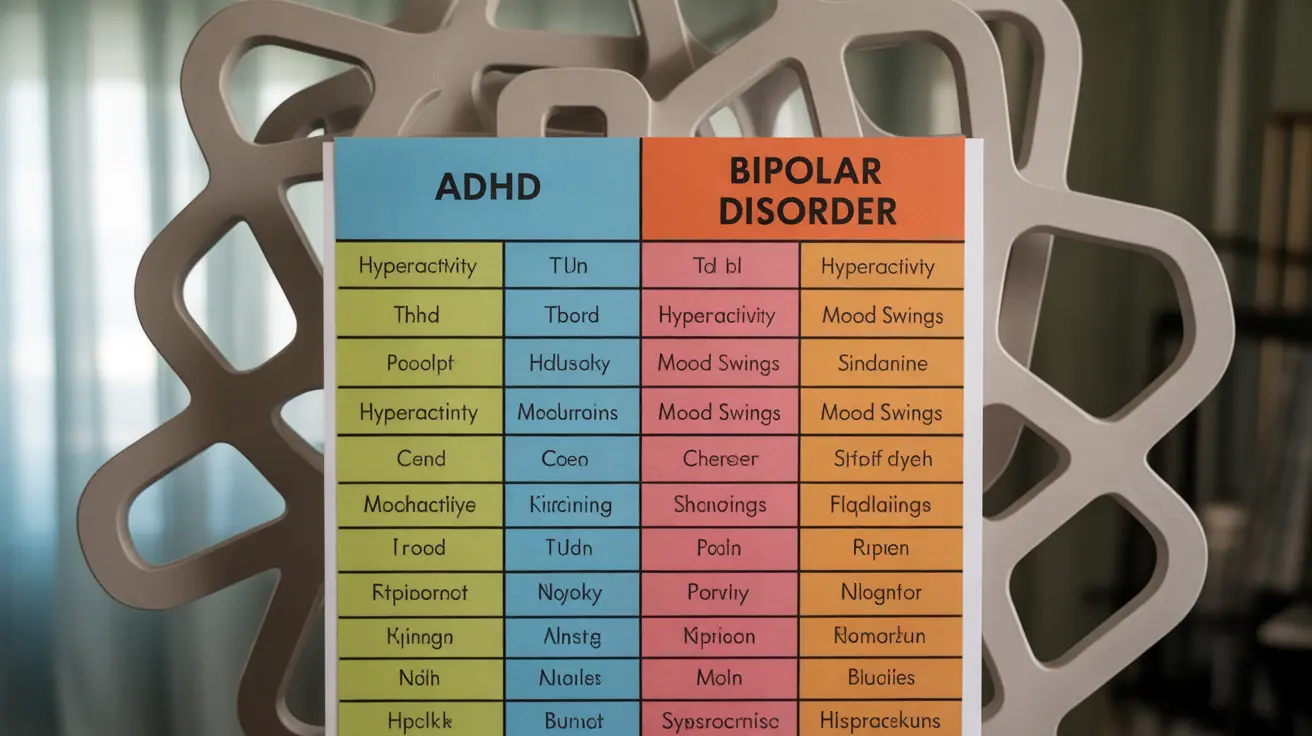Living with mental health conditions can be challenging, especially when symptoms overlap and make diagnosis complex. Two conditions that often share similar characteristics are Attention Deficit Hyperactivity Disorder (ADHD) and bipolar disorder. Understanding the distinctions between these conditions is crucial for proper diagnosis and treatment.
In this comprehensive guide, we'll explore the key differences between ADHD and bipolar disorder, their unique symptoms, diagnostic challenges, and treatment approaches. This information will help you better understand these conditions and recognize when to seek professional help.
Understanding ADHD and Bipolar Disorder Individually
ADHD Characteristics
ADHD is a neurodevelopmental disorder that typically appears in childhood and can persist into adulthood. Key features include:
- Difficulty maintaining focus and concentration
- Impulsive behavior
- Hyperactivity
- Problems with organization and time management
- Easily distracted by external stimuli
Bipolar Disorder Characteristics
Bipolar disorder is a mood disorder characterized by distinct episodes of emotional extremes. Primary features include:
- Manic or hypomanic episodes with elevated mood
- Depressive episodes
- Cyclical mood patterns
- Changes in energy levels and sleep patterns
- Potential psychotic symptoms during severe episodes
Key Distinguishing Features
Mood Patterns
The most significant difference lies in how mood changes manifest. ADHD typically involves consistent patterns of inattention and hyperactivity, while bipolar disorder features distinct episodes of mania and depression that can last for weeks or months.
Age of Onset
ADHD symptoms typically appear in early childhood, before age 12. Bipolar disorder usually develops later, often emerging in late adolescence or early adulthood, though it can occasionally appear in children.
Diagnostic Challenges and Overlap
Common Overlapping Symptoms
Several symptoms can appear in both conditions, making diagnosis challenging:
- Difficulty focusing
- Impulsivity
- Increased energy levels
- Sleep problems
- Emotional reactivity
Professional Assessment
Mental health professionals use various tools to differentiate between these conditions, including:
- Detailed medical history
- Family history evaluation
- Behavioral assessments
- Mood tracking
- Psychological testing
Treatment Approaches
ADHD Treatment Options
Common treatments for ADHD include:
- Stimulant medications
- Non-stimulant medications
- Behavioral therapy
- Educational support
- Organizational skills training
Bipolar Disorder Treatment Options
Primary treatments for bipolar disorder involve:
- Mood stabilizers
- Antipsychotic medications
- Psychotherapy
- Lifestyle modifications
- Regular sleep schedule maintenance
Frequently Asked Questions
What are the main differences between ADHD and bipolar disorder symptoms?
The primary difference is in the pattern of symptoms. ADHD symptoms are typically consistent and ongoing, while bipolar disorder involves distinct episodes of mania and depression. ADHD affects attention and behavior regulation, whereas bipolar disorder primarily impacts mood and energy levels.
How can doctors tell if someone has ADHD, bipolar disorder, or both?
Doctors use comprehensive evaluations including detailed patient history, family history, psychological assessments, and mood tracking. They look for the timing and pattern of symptoms, with particular attention to whether symptoms are episodic (bipolar) or constant (ADHD).
Why is it hard to diagnose bipolar disorder in people who already have ADHD?
The overlap in symptoms like impulsivity and energy fluctuations can mask bipolar symptoms in ADHD patients. Additionally, ADHD's constant symptoms may make it harder to identify the distinct episodes characteristic of bipolar disorder.
Can bipolar disorder cause mood changes that don't happen with ADHD?
Yes, bipolar disorder causes specific mood episodes including mania and depression that aren't present in ADHD. These episodes can include symptoms like grandiosity, decreased need for sleep, and severe depression, which aren't typical ADHD features.
What are the treatment options for managing ADHD vs bipolar disorder?
ADHD typically requires stimulant medications and behavioral therapy, while bipolar disorder is treated with mood stabilizers and antipsychotics. When both conditions co-exist, treatment plans must be carefully coordinated to avoid triggering bipolar symptoms while managing ADHD.




